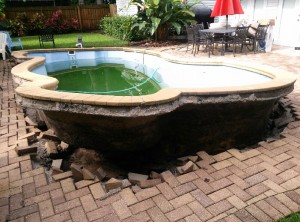A pool popping out of the ground is one of the most horrendous events that can befall a homeowner or contractor.
Several years ago a St. Petersburg client called to say that their pool had popped out of the ground while they were in the process of having it drained and cleaned. We had heard stories of this happening before but until you’ve seen it for yourself, you can’t imagine the extent of the damage a popped pool can cause.
The fiberglass pool shell lifted close to two feet out of the ground. As it rose, the surrounding dirt and sand caved in, partly filling the resulting hole and making resettling the pool impossible. Heavy rains soon followed and pushed even more dirt into the whole. PVC piping carrying water to and from the filter was damaged. Most of the coping cracked off and fell to the bottom. Hundreds of paver blocks that once created a delightful outdoor seating area were ripped up; many ended up in the hole. The backyard and the pool were a disaster.
Luckily, the contractor with whom they were working was fully insured.
This is not a DIY project. Hire a professional.
There was essentially no way our clients, or any unskilled person, would have been able to repair the pool themselves. Insurance companies, equipment acquisitions and an exceptionally rainy summer all conspired to delay repairs for our clients; but once work started it moved quickly.
First, a crane came through the backyard to lift the shell out of the hole and place it on the lawn. Then a backhoe came through the front yard to re-excavate the hole and pile the spare dirt and sand on the patio, the lawn, in the flowerbeds, basically everywhere they could store huge piles of dirt in an already tight backyard. Once all the pipes had been reset, and the hole was prepped, the crane returned to lift the shell back into the hole. The job of backfilling all the dirt is still going on.
In the process of removing, re-digging, repairing and replacing the pool, irrigation lines were crushed, bushes and trees were uprooted, fences had to be moved and replaced. The lawns were smothered by dirt and filled with deep ruts from the heavy machinery. The contractor had assured the homeowners that all will be repaired satisfactorily.
On top of that, the pool they had so looked forward to enjoying all summer was out of commission. It’s safe to say it was a complete nightmare for our clients and would have been an even larger one if they had attempted the repairs themselves.
So how did this happen and how can you avoid having this happening to your pool?
Concrete (or gunite), vinyl-lined and fiberglass pools are subject to popping. High groundwater areas are common throughout the St. Petersburg-Tampa area; especially with the heavy rains the area receives in the summer. Pool popping occurs when the pressure of the groundwater exceeds the pressure of the pool. This is normally not an issue when the pool is full because the pressure from the water in the pool is equal or greater than the groundwater. If you need to repair or clean the pool, you may have to drain the pool partially or completely thus changing the downward pressure. There are steps to take to decrease the chances of the pool popping.
First, you should remove the surrounding groundwater before draining the pool. You can use a dewatering system included in the swimming pool system or use an external one. You can also drill small holes in the pool starting at the shallow end and continuing across the break. These holes can allow pressure from the ground water room to escape and not push against the shell. The holes can always be patched before refilling the pool.
Our best advice: Draining and pool repairs should be left to experienced, licensed, and insured contractors.
Editor’s note: This post was first published in September 2013. It’s been updated with new information and edited for cohesiveness.
Leave a Reply